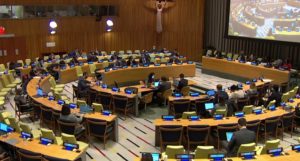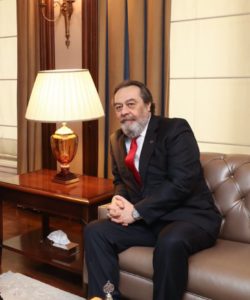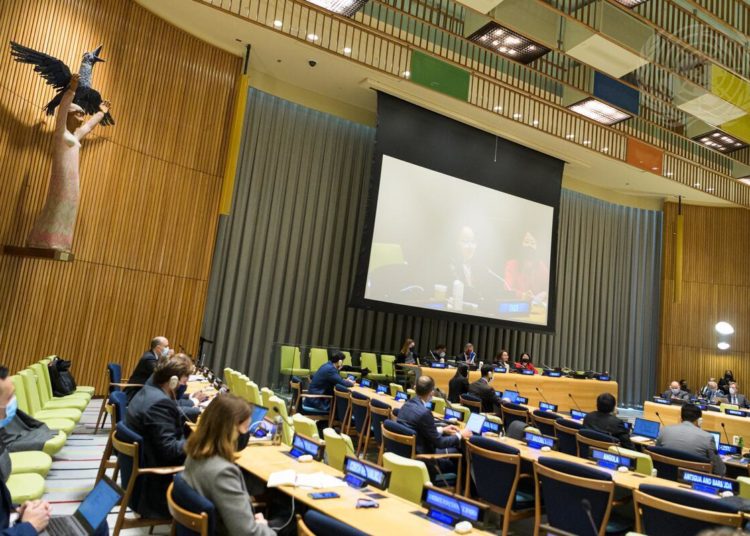Abdullah Bozkurt/Stockholm
Turkey’s global campaign to go after nongovernmental organizations that are critical of the government of President Recep Tayyip Erdoğan on a range of issues continues unabated with the latest target being a prominent, Geneva-based NGO that fights transnational organized crime.
In a letter to the United Nations office in Vienna, the Turkish government asked the UN to bar the Global Initiative Against Transnational Organized Crime, also known as the Global Initiative, from attending UN proceedings.
Ankara claimed the NGO, which is composed of a network of law enforcement, governance and development practitioners and was linked to a terrorist group without providing any evidence to support the allegation. The organization was initially established with funding and operational support from the governments of both Norway and Switzerland.
The Turkish move follows an ongoing pattern of relentless and systematic efforts by the Erdoğan government to suppress international NGOs that are involved in work that may be critical of Turkey. Turkey has in the past blocked the participation of foreign NGOs at UN events, citing similar claims and leveling bogus charges that prompted a wave of criticism from countries that host these NGOs in their territories.
Turkey’s pursuit of foreign NGOs came after the Erdoğan government shuttered well over a thousand NGOs in Turkey in 2016 and 2017, again on fabricated terrorism charges.
The letter by Ambassador Ahmet Muhtar Gün, permanent representative of Turkey to the United Nations Office in Vienna, that sought to block the participation of a Geneva-based international NGO at a UN event:
The letter submitted on December 20, 2021 by Ambassador Ahmet Muhtar Gün, permanent representative of Turkey to the United Nations Office in Vienna, alleged that Global Initiative was supportive of the Gülen movement, a critic of the Turkish government on a range of issues from corruption to Turkey’s aiding and abetting of armed jihadist groups.
The movement came under a crackdown in Turkey in the aftermath of the December 2013 corruption investigations that incriminated Erdoğan, his family members and his business and political associates. Despite overwhelming evidence of crime, Erdoğan dismissed the corruption allegations, sacked the prosecutors and police chiefs involved and hushed up the graft probes.
Erdoğan claimed that the probes were a coup against his government and accused the movement of masterminding the investigation, a claim the movement denied. In recent years many media outlets, NGOs and individuals who criticized the Erdoğan government for pervasive corruption were viciously targeted, with many facing criminal investigations and malicious prosecutions on bogus terrorism charges.

Turkey follows the same playbook of fabricating terrorism charges to smear foreign NGOs and abuse international mechanisms to suppress criticism, intimidate those who dare to speak up against the policies of Turkey and silence critical voices in global platforms. The Turkish mission’s move against Global Initiative was aimed at punishing the NGO by denying its participation in an upcoming UN event titled “Meeting of the Ad Hoc Committee to Elaborate a Comprehensive International Convention on Countering the Use of Information and Communications Technologies (ICTs) for Criminal Purposes.”
The meeting aimed to promote and strengthen measures to prevent and combat the use of ICTs for criminal purposes and cybercrime, while protecting ICT users from such crime. It hoped to facilitate and support international cooperation in preventing and combating the use of ICTs for criminal purposes/cybercrime. The UN hopes to provide practical tools to enhance technical assistance among member states and build the capacity of national authorities to prevent and combat the use of ICTs for criminal purposes.
Two letters to the UN from the Turkish Mission in New York repeating calls to prevent an NGO from attending a UN event:
For that, the UN actively works with private sector, NGOs, civil society and academics to promote its agenda, and many NGOs whose work focuses on cross border crime were set to participate in the event. However, Turkey claimed that UN is an intergovernmental organization and that the event must be led by member states. Turkey’s objection was rejected by the UN, which prompted second and third letters by the Turkish Mission to the UN in New York on February 24, 2022.
The Turkish campaign failed to prevent the NGO from attending the meeting at UN headquarters from February 28 to March 11, 2022. Mark Shaw delivered remarks on behalf of Global Initiative and expressed his thanks to the chair and the secretariat for moving forward.
Although Turkey failed to prevent Global Initiative from participating in the UN event, it recently succeeded in blocking eight NGOs — that are not even present in Turkey — as observers at an anti-corruption conference, citing unfounded accusations of terrorism. Turkey submitted two letters on September 28 and November 24, 2021 declaring its opposition to the participation of the eight NGOs — Access Info Europe (Spain), Alliance on Civic Initiatives Promotion (Kyrgyzstan), Central Asia Research Institute on Corruption and Money Laundering (Kyrgyzstan), Expert Forum (Romania), Integrity Initiatives International (US), The Good Lobby (Italy), Transparency International (Georgia) and EUROTHINK – Center for European Strategies (North Macedonia).

The EU member states as well as the US, UK, Australia and several others highlighted Turkey’s negative role in preventing the NGOs’ attendance at the conference. Speaking on behalf of 41 member states, including EU countries, a Slovenian diplomat said nongovernmental organizations played a key role in supporting the global fight against corruption. A US diplomat also criticized Turkey, saying there was no adequate proof to bar NGOs from participating in the event and expressed regret that a number of states parties had used the conference session to further interests that were outside the scope of the convention.
A European Union diplomat then warned that Turkey’s objections set a dangerous precedent as none of the nongovernmental organizations were based in the country that was objecting to them. He rejected the Turkish government’s accusations of terrorism against the NGOs and underlined that the European Union had serious concerns in relation to the objection of Turkey to the participation of the eight nongovernmental organizations.
Turkey had gone after NGOs at the UN in the past. In 2017, upon a special request from Turkey, the Committee on Non-Governmental Organizations canceled the consultative status at the UN Economic and Social Council (ECOSOC) of leading charity Kimse Yok Mu, the Journalists and Writers Foundation (GYV) press freedom advocacy group and the Turkish Confederation of Businessmen and Industrialists (TUSKON), all affiliated with the Gülen movement, a critic of the Turkish government.
Statement delivered at the UN event by the Global Initiative Against Transnational Organized Crime:
Without presenting any evidence linking these NGOs to any violence or terrorism and simply citing the fact that they had been shut down by the government with decree-laws under a state of emergency and therefore had ceased to exist, Turkish diplomats at the UN asked the committee to remove their consultative status with the UN. None of the NGOs were provided an opportunity to defend themselves against the serious charges or make their case before the committee.
The GYV moved its operations out of Turkey and registered itself as an NGO in the United States following an unprecedented crackdown on NGOs in Turkey. Yet that did not help the GYV from losing its official status at the UN due to the Turkish government’s lobbying campaign.
Among the 1,325 associations and foundations in Turkey shut down on charges of terrorism in 2016 and 2017 by government decrees that are not subject to any effective judicial or legislative scrutiny are health, sports, education, charitable, unionist and other advocacy groups that apparently have nothing to do with terrorism or any other crime, such as the Anatolia Medical Ontology Foundation, the Gastrointestinal Oncology Foundation and the Health for Everyone Association. They were targeted because of unconstitutional profiling by the government, targeting critics, minorities, opponents and anybody else who is unwilling to toe the line of the Islamist government in Turkey.












